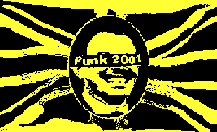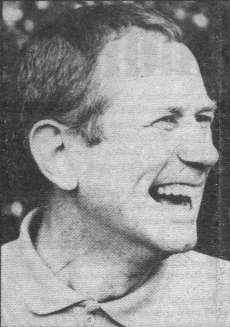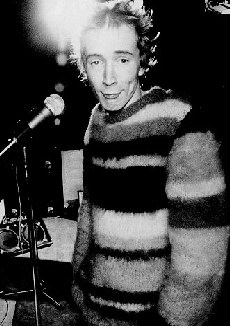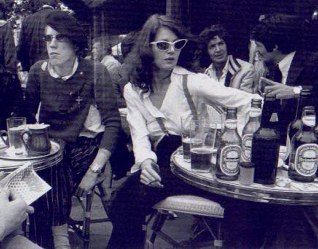 |
Academia in the UK
The spirit of 1977 is alive and well -
at Wolverhampton University's conference on punk.
Lucy O'Brien went along
|
 "I am a political animal. Standing around raving in a field, waving your arms in the air had no meaning for me. I wanted something that would shout and be snotty. I wanted something to identify with, and move me. That's when I discovered the Clash."
"I am a political animal. Standing around raving in a field, waving your arms in the air had no meaning for me. I wanted something that would shout and be snotty. I wanted something to identify with, and move me. That's when I discovered the Clash."Twenty-five-year-old student Nick Burton was a mere babe in arms when the Clash had their first hit in 1977 with White Riot. Last weekend she was at No Future?: Punk 2001, an international conference at Wolverhampton University marking the 25th anniversary of the "summer of 76", giving a paper entitled: "So what has punk ever done for us? A Silver Jubilee kid speaks out."
Burton is part of a new generation unearthing 70s punk. An era that resurfaced with Seattle grunge and Riot Grrrl in the early 90s, punk has since been fully plundered by a host of nu-metal merchants such as Limp Bizkit and Linkin Park, along with hip New Yorkers the Strokes, who recall the mid-70s CBGBs scene with their chord-driven street rock and skinny ties.
"Maybe they'll be interested in my skinny ties. I've got hundreds," says Gary Valentine, the former Blondie bassist, who showed up at the conference to read from his forthcoming memoir, New York Rocker. At a time when "Prada-Meinhof" combat rock chic is moving from the catwalk to the pavement, when David Beckham wears Crass T-shirts and Madonna flirts with the punk style of Vivienne Westwood's 70s Sex, why does punk still hold such fascination?
"I like the feeling. The attitude. The refusal to conform," says Jamie Sherry, who, in his mid-20s, is one of the younger people at No Future.
The brains behind the event are Mark Jones, a lecturer in English at Wolverhampton University, and Alan Apperley, a lecturer in politics who also happens to have been a guitarist with the Prefects, a 70s punk outfit whose claim to fame was a song called VD that lasted seven seconds ("John Peel talks about it to this day"). Coming Down Fast, a conference on the 60s held at the university in 1988, had been a great success, and Jones saw an opening for a similar experiment with punk.
What intrigued Apperley was "how punk history came to be written by a few victors such as McLaren. A number of different histories can be written. Punk was never a unified movement, more an attitude in common." Tickled about using university funds to stretch the boundaries of academia, he adds, in true punk soundbite fashion, "We wanted to take it out of the ivory tower to the streets."
They achieved this with a week of events at the Light House media centre, spanning film (including Jubilee and Rock'n'Roll Swindle, natch), live gigs with stalwarts such as John Cooper Clarke, the Vibrators and Wreckless Eric, plus a half-day festival at the Varsity of punk bands including local teenage outfit the Penetraitors. The conference itself featured over 50 talks and papers.
When they launched their website earlier this year, the No Future collective was besieged by papers on everything from body modification to an ethnographic study of punk activity as a lifestyle. They received submissions from Indonesia, New Zealand, Japan, the US and Croatia. They also had to contend with an online campaign against incorporating punk into the academy. "People tried to disrupt proceedings by sending fake papers," says Jones.
 Penny Rimbaud drummer and guru of Crass and Anarchy Incorporated. October 1986 in a lighter mood!
|
One of their most vociferous opponents was Penny Rimbaud, drummer with anarcho-punks Crass. "It irritated me beyond belief," he fumes. "Academics sitting round talking about something so anti-academic. It's as absurd as the Hayward gallery putting on a show of dada art." As a result he was invited to speak, and came along to argue that, "If it hadn't been for Crass, Johnny Rotten and the rest of those pop stars would've disappeared into obscurity." Crass, he says, gave punk the political ballast to survive into the 21st century, its legacy reflected in Seattle, Prague, anti-globalisation and animal rights.
|
 Johnny Rotten of the Sex Pistols December 1976 on the eve of the Anarchy In The UK Tour
|
As the predominantly fortysomething crowd of ex-punk academics and musicians mingled, some wondered whether this was punk in mid-life crisis. "I think punk is hyped up as an ongoing cultural force by people who are nostalgic for their youth," scoffs Stewart Home, a guest speaker and author of Cranked Up Really High, a provocative critique of Oi bands.
For Jordan, who worked as an assistant in McLaren and Westwood's shop, Sex, and was one of the "faces" of punk, academia is a strange place to be. "I'm anti-nostalgia," she says. "Nostalgia doesn't build much that's new. The academic world reads more into punk than there probably was." That's as may be, but last weekend they all had great fun doing it.
Over the course of the two days we had "Punk and metal: antithesis, synthesis or prosthetic?"; "From neo-nazis to satanists: moral panics regarding punk in Slovenia in the 80s and 90s", and "Tattooing: how the King's Road savage was tamed by consumer capitalism". Along with spectacles and signifiers, "contestation" became the buzzword. When we weren't "unpacking" punk, we were "interpolating" its aesthetics.
Gary Valentine offered some light relief from the academic jargon. "Debbie Harry and Chris Stein would get on my case for pogoing round the stage all the time," he said. His talk on the New York "blank generation" was florid and entertaining, with memories of Harry's "serious bedroom eyes", Stein's penchant for "playing the guitar like a banjo", and Richard Hell, "looking like Frankenstein with malnutrition". Malcolm McLaren was simply "a goofy British guy hangin' out with all these wild clothes. He was seen as someone trying to make his way in."
Throughout the weekend, debate raged over points of authenticity: whether true punks really gobbed on their idols, or whether it was oiks from the provinces who spat because they had read about it in the Daily Mirror. Then there was the question of whether the Clash were really revolutionaries or, according to Rimbaud, a band with no agenda. "One year they were saying, 'I'm so bored with the USA.' The next they were snorting coke in New York." And lastly, whether punk was politically effective.
Ex-Clash manager and artist Caroline Coon addressed this point in a passionate talk accompanying the launch of her exhibition, a photographic collection from the mid- to late 70s. Exhibits include a shot of Slits' singer Ari Up showing off her silver jubilee knickers, Oi fans doing Nazi salutes, and members of the Clash, Pistols and Steel Pulse demonstrating outside the National Front HQ. To Coon, of course, punk was intensely political. She recalled how much it hurt to hear Johnny Rotten say, "You hippies have failed", and to see a youth culture which, "faced with an uncaring establishment", rejected peace and love for aggression and self-mutilation. Looking like a latter-day Clytemnestra with her witchy shock of hair and green yeti coat, she ended her speech with a blood-curdling scream of rage.
|
 Miss Coon back in 1976 in gay Paree with a particular gruesome looking Frog!
|
With so many disparate views on punk, it was bound to be a conference of "contestation", with personal accounts rubbing up against theoretical argument. Punk, it was felt, has had a kind of sleeper effect. The DIY approach, the political rigour, the sense of egalitarianism, are surfacing now that ex-punks are - like Blair's 60s generation before them - rising to positions of power in government, media and education.
So what do the class of 76 feel about the fact that so many of them have embraced the hippy ethos that they once despised? According to Coon, "Hippy and punk are part of the same protest. They're both about sharing, both set against authoritarianism."
By Sunday lunchtime, most had talked the talk and a fair few were nursing monstrous hangovers. True to the nature of punk, in place of a closing plenary, everyone adjourned to the pub. They talked about making No Future? a biannual conference and taking it on the road. Anarchy would live to fight another day.
• Caroline Coon's exhibition, No Future?: Photographs from the Early Days of Punk, is at Wolverhampton Light House until 26 October. Details on 01902 716055. No Future website: www.wlv.ac.uk/no-future
LUCY O'BRIEN
(The above piece was blatantly nicked from the Thursday September 27, 2001 edition of The Guardian. And being as Nihilism On The Prowl couldn't even attend one poxy event on it's own doorstep. (Was busy getting blindo in London). I thought it would give you some idea of what we missed or maybe not? Lucy supplys the text. I lazily supply the images. Talking of which hoping to catch the Caroline Coon exhibition when I next sign on as it was shut the last time I checked. So a review will be up soon)


